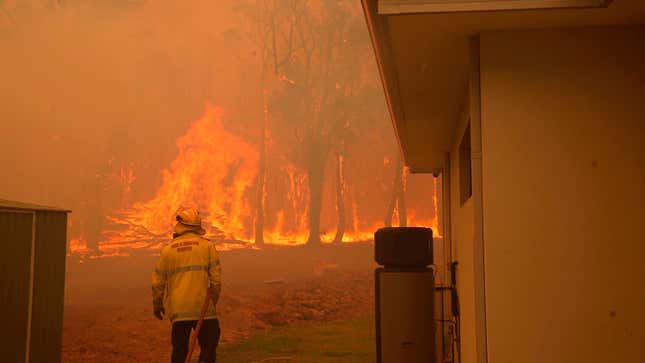
It’s looking apocalyptic Down Under. Thousands of people were forced to leave their homes in the state of Western Australia this week as wildfires tore through an area close to the city of Perth, right as the city began a strict lockdown due to the coronavirus pandemic.
Officials say the Wooroloo Fire, which has a 50-mile (80-kilometer) perimeter, doubled in size overnight and has already destroyed almost 20,000 acres. More than 70 homes have been lost since the fire began Monday evening, including 80% of all properties in one rural area.
In a media briefing Wednesday, Western Australia Premier Mark McGowan said the state was in an “unprecedented situation.”
“We’re fighting disasters on two fronts: the devastating bushfires and the Covid-19 pandemic,” McGowan said.
The city and parts of Western Australia were already under a strict five-day lockdown after a security guard at a hotel used as a quarantine facility in Perth tested positive for coronavirus Monday. This may seem like overkill for just one case, but these types of aggressive measures have kept Australia’s total deaths during the pandemic to less than 1,000.
The quarantine in Australia’s fourth-largest city was scheduled to lift Friday, but officials told residents that evacuation orders and personal safety during the fire overrode any pandemic lockdown orders from the government. The U.S. dealt with a similar situation this past year (minus the lockdown stuff) as wildfires tore across the West, forcing widespread evacuations even as the pandemic raged. Australia’s pandemic is, thankfully, more under control, but the evacuations risk upsetting the delicate balance the country has achieved.
“Let me be clear: I urge people to stay informed and prepare themselves,” Western Australia police commissioner Chris Dawson told residents Wednesday. “If you are under threat, leave your property and go to suitable premises. Do not stay in the property if you think you have to obey the covid-19 rules.”
It’s summer in Australia, and bushfire season has become increasingly more destructive as the planet warms. Devastating fires last year killed at least 34 people and burned through 48 million acres. Scientists estimate that a jaw-dropping 3 billion animals also died or were displaced, pushing 113 species to the edge of extinction.
Last year was the country’s fourth-hottest year on record, Australia’s weather bureau said last month. For Western Australia, the rank was even higher with the state experiencing its second-hottest year. Lesley Hughes, a member of Australia’s Climate Council and bushfire expert, said in a statement that “in the past few months the southwest has received very little rainfall compared to the rest of the country. This is part of a long-term drying trend, with winter rainfall declining 20 percent since the 1970s.”
This lines up with the increasing dire situation not just for the state, but across Australia. A report released last year showed that climate change exacerbated the hot, dry conditions that led to the intense bushfire season by as much as 30 percent. Rising temperatures will only make the landscape more flammable.